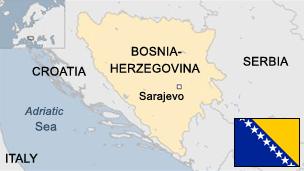Bosnia-Herzegovina profile - Overview
- Published

Bosnia-Herzegovina is recovering from a devastating three-year war which accompanied the break-up of Yugoslavia in the early 1990s.
The 1992-1995 conflict centred on whether Bosnia should stay in the Yugoslav Federation, or whether it should become independent.
It is now an independent state, but under international administration. Its three main ethnic groups are Bosniaks (Bosnian Muslims), Croats and Serbs. The war left Bosnia's infrastructure and economy in tatters. Around two million people - about half the population - were displaced.
It is considered one of the most corruption-prone states in Europe, mainly on account of the legacy of deep ethnic and political divisions left by the 1992-1995 war and by the country's complex administrative framework.
International administration, backed at first by Nato forces and later by a smaller European Union-led peacekeeping force, helped Bosnia to achieve a measure of stability.
Bosnia includes Christians and Muslims, like this man preparing for a pilgrimage
But early in 2007 the International Crisis Group, a think tank, warned: "Bosnia remains unready for unguided ownership of its own future - ethnic nationalism remains too strong."
The 1995 Dayton peace agreement brought to an end the bloodshed of the 1992-1995 war but entrenched the results of "ethnic cleansing", cementing the divide in the country.
The Dayton accord set up two separate entities; a Bosniak-Croat Federation of Bosnia and Hercegovina, and the Bosnian Serb Republic, or Republika Srpska, each with its own president, government, parliament, police and other bodies.
Overarching these entities is a central Bosnian government and rotating presidency. In addition there exists the district of Brcko, a self-governing administrative unit established as a neutral area placed under joint Serb, Croat and Bosniak authority.
This elaborate multi-tiered system of government, with cabinets and parliaments on state, entity and cantonal levels, means that Bosnia is now overburdened with politicians and civil servants, many of whom continue to receive salaries out of proportion with the country's impoverished condition.
Dayton also established the Office of the High Representative. The Office's representative is the state's ultimate authority, responsible for implementation of Dayton and with the power to ''compel the entity governments to comply with the terms of the peace agreement and the state constitution''.
Critics of Dayton said the entities it created were too close to being states in their own right and that the arrangement reinforced separatism and nationalism at the expense of integration.
Negotiations to amend the existing constitution, established by Dayton in order to strengthen state institutions and transform the country into a non-ethnic parliamentary democracy, have so far failed to make much progress.
EU talks
A woman prays at a memorial to victims of the bitter civil war of the 1990s
In a bid to encourage Bosnia to resolve its ethnic divisions and eventually qualify for EU membership, EU foreign ministers gave the go-ahead in late 2005 for talks on a Stabilisation and Association Agreement with the country.
The Agreement was initially signed in 2008, but its implementation was delayed by Bosnia's failure to make constitutional amendments called for by the European Court of Human Rights, which said that members of other ethnic minorities should be able to run for senior posts currently reserved for Bosniaks, Croats and Serbs under the system inherited from Dayton.
The European Union eventually agreed to go ahead with the Agreement in March 2015, deeming that Bosnia had made significant economic and democratic progress, although much remains to be done before there can be any serious prospect of EU membership. Bosnia submitted a formal application to join the Union in February 2016.
The prospect of talks with the EU increased pressure for the capture of two key Bosnian Serb war crimes suspects, Radovan Karadzic and Ratko Mladic.
After nearly 13 years on the run, Radovan Karadzic was arrested in July 2008 by Serbian security forces in Belgrade. His trial on war crimes charges opened at the UN tribunal in The Hague in October 2009. Ratko Mladic was arrested by Serbian intelligence officers in a village near Belgrade in May 2011. In March 2016, the UN tribunal found Radovan Karadzic guilty of genocide and war crimes and sentenced him to 40 years in jail.
The Bosnian Serb leadership continues to be resentful at having to accept the authority of the High Representative, giving rise to suspicions that its ultimate goal is for the Republika Srpska to break away from the Bosniak-Croat Federation.
In all elections that have been held since the end of the 1992-1995 war, the country's different communities have almost invariably voted along ethnic lines, with nationalist parties usually doing better than more moderate ones - a tendency which has inevitably reinforced the ingrained disunity of the Bosnian state.